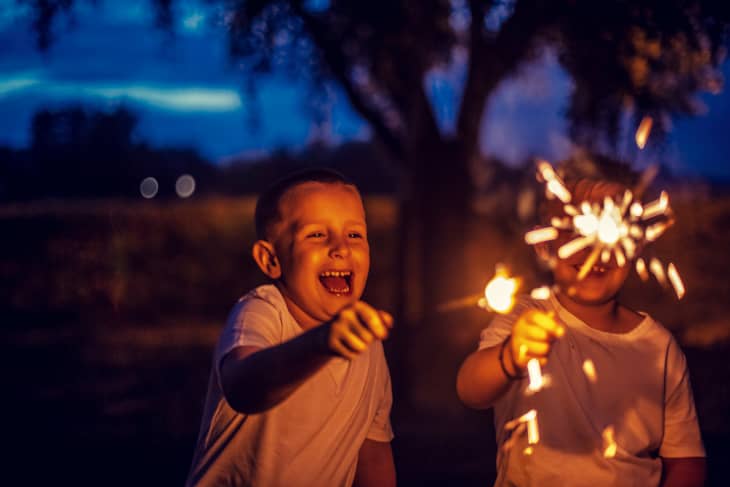10 Things Emergency Room Doctors Wish Parents Knew About the 4th of July

Aside from school being out, there are so many things that make summer one of the most exciting times of childhood — from summer camps to swim lessons to family BBQs, it’s basically a three-month fun-cation. And for many families in the United States, the 4th of July is the culmination of all that summer excitement. Fireworks and burgers and Popsicles, oh my!
But as fun as Independence Day celebrations can be, it’s important to know what the biggest risk factors are. From preventative measures to hidden dangers, we spoke to a handful of medical professionals about what they wish parents knew before embarking on their July 4th celebrations. Here’s everything you need to know.
1. Know that sparklers are just as dangerous as other fireworks.
“Fireworks, like sparklers, are still extremely dangerous if not handled with care, yet many parents think it’s safe to allow children to hold sparklers on July 4th. Sparklers can burn at temperatures from a thousand degrees up to nearly 3000 degrees and that could result in a serious injury, permanent disability from severe burns, high energy blast injuries, or even an amputation.” —Dr. Joanne Zhang, hand surgeon at Hoag Orthopedic Institute
2. Be especially cautious around bodies of water.
“Water activities and water sports are very common on the 4th, and swimming safety is essential. Never let young ones swim alone or without adequate supervision, and be sure they use life vests and flotation devices. Ensure gates to pools are closed and locked so no young children unintentionally fall into a pool when people aren’t around.” —Dr. Garrett Fidalgo, emergency medicine physician, author at Parenthood Adventures
3. Be sure to store your BBQ foods properly.
Barbecues and picnics are staples of the typical celebrations, but food left out in the heat for too long can quickly become a breeding ground for bacteria, which can lead to food poisoning. Store food properly and discard anything that’s been out too long. Also, watch for potential choking hazards in children, like hot dogs, hard candies, and popcorn. —Dr. Harvey Castro, emergency medicine physician, and CEO of ConvoGPT
4. Always douse spent fireworks with water before throwing them away.
“Keep a bucket of water or a garden hose handy in case of fire or other mishap. After fireworks complete their burning, douse the spent device with water from a bucket or hose before discarding it to prevent a trash fire.” —Dr. Joanne Zhang, hand surgeon at Hoag Orthopedic Institute
5. If you get burnt, don’t ice it.
“If you experience a firework injury, head to the nearest emergency room as soon as you can. In the meantime, wrap the injury in a slightly damp clean cloth to keep it moist. Do not ice it — ice may lead to more damage to the traumatized tissue.” —Dr. Joanne Zhang, hand surgeon at Hoag Orthopedic Institute
6. Take road safety seriously.
July 4th is a day with one of the highest numbers of traffic accidents and fatalities. There are many people on the road and many distracted drivers — drunk driving is also unfortunately very common. Kids should always wear seatbelts and be in the proper car seats when riding in a car and should be very careful when walking or playing in the streets — especially at night as it gets dark. Consider having kids wear reflective clothing or light-up outfits of some kind, hold hands when crossing the street, and avoid playing in the streets. —Dr. Garrett Fidalgo, emergency medicine physician, author at Parenthood Adventures
7. Avoid buying fireworks packaged in brown paper bags.
“This is often a sign that the fireworks were made for professional displays and that they could pose a danger to consumers.” —Dr. Joanne Zhang, hand surgeon at Hoag Orthopedic Institute
8. View a local firework display (it’s your safest bet).
“Firework injuries are a very common injury, with most of the injuries occurring to the hands and fingers, followed by injuries to the head, face, eyes, and ears. It’s safest for your family to just view the fireworks at a local 4th of July firework show.” —Dr. Garrett Fidalgo, emergency medicine physician, author at Parenthood Adventures
9. Keep an eye on your alcoholic beverages.
“It’s crucial to keep alcoholic beverages out of reach of children. Kids are naturally curious, and they might mistake those colorful drinks for something harmless. Also, it’s important for parents to be responsible role models. If you’re consuming alcohol, do so in moderation. Excessive alcohol intake can impair judgment and coordination, increasing the risk of accidents and injuries. If you’re hosting a party, make sure to provide non-alcoholic options for designated drivers or those who choose not to drink. And finally, if you suspect someone is experiencing alcohol poisoning or any severe symptoms after drinking, don’t hesitate to seek immediate medical help.” —Dr. Praveen Guntipalli, medical director and owner of Sanjiva Medical Spa
10. Have kids drink water, water, and more water.
July 4th falls in the peak of summer, when the temperature can rise significantly. In most outdoor activities, dehydration, heat exhaustion, and heat stroke can become threats. Keep children hydrated by making them drink water frequently, and ensure they have a shady spot to retreat to when the sun becomes too intense. Remember, children can become overheated more quickly than adults, so monitoring them closely for signs of heat-related illnesses is essential. —Dr. Harvey Castro, emergency medicine physician, and CEO of ConvoGPT
Cubby: Eat. Live. Play. Families Together at Home.
Want more great home ideas for families? Sign up for Cubby’s weekly newsletter featuring our best editor-approved product recommendations, meal ideas, and all the kid’s room decor ideas you need.